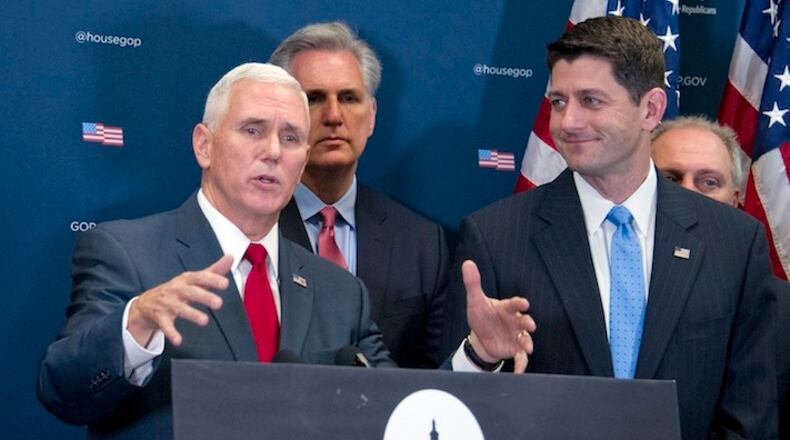Vice President Mike Pence is moving into House Speaker Paul Ryan's neighborhood, creating a new power center where Republican lawmakers can lobby the White House and plot strategy without Ryan.
Republicans in the House of Representatives like Ryan, but they love Pence, a conservative favorite who was an Indiana congressman from 2001 to 2013 and widely regarded as a rising star. He was well-liked, rising to Republican conference chair, a top leadership role, before leaving to run for governor of Indiana.
Now Pence is vice president, an office that also means he's president of the Senate, able to break ties. It traditionally does not mean he gets a House office.
But he will. He'll have a place on the first floor of the Capitol, one floor down from Ryan's and down the hall from Majority Leader Kevin McCarthy's, an area where lawmakers can easily reach the vice president.
"He feels his history comes from the House," said Rep. Ted Budd, a first-term North Carolina Republican. "He's going to be a great help."
"He understands the intricacies of the House," added Rep. Mike Bost, a second-term Illinois Republican.
And perhaps most important, he's seen as a staunch, unyielding conservative. When he left Congress, his lifetime rating from the American Conservative Union was 99. Ryan's at the time was 91.
The Wisconsin Republican, a reluctant recruit as speaker, was acceptable to the renegade conservatives who helped push Republican Speaker John Boehner of Ohio out of office in 2015.
Neither Ryan's office, nor Pence's, would comment on the vice president's role on Capitol Hill. But when introducing Pence at the Republican congressional retreat in Philadelphia last month, Ryan described him as "the glue that keeps us all together."
"The vice president sharpens all of us," Ryan said. "He makes all of us better."
While Ryan has solid conservative credentials, Pence's are even stronger.
As governor of Indiana, Pence pushed for changes to Medicaid, the federal-state health care program for lower-income people and those with disabilities, that have become a model for other Republican governors. Among those changes: Beneficiaries have to pay a small premium to receive coverage.
Pence found himself caught between business leaders and social conservatives, though, when he signed a controversial law that allowed businesses to discriminate against lesbian, gay, bisexual and transgender people for religious reasons. Pressure from the state's business community led the Indiana Legislature to modify the law.
While having a vice president in the House is unusual, there is one recent precedent: Dick Cheney, who had been a congressman from Wyoming in the 1980s and had a brief stint as the second-ranking Republican, got a House office as President George W. Bush's vice president from 2001 to 2009.
But Cheney had not been a congressman for 12 years, and Bush had been a governor and the son of a president. Bush knew Washington's quirky rhythms. Trump has never held office and Pence is considered an important player in providing insight and strategy.
Like Cheney before him, Pence plans to attend weekly lunch meetings with Senate Republicans. He told ABC News last year that Cheney was his role model and he planned to be "a very active vice president."
"I expect to see a lot of him," said Sen. Thom Tillis, a North Carolina Republican who said Pence had already visited the Capitol multiple times.
The enduring affection many members of Congress have for Pence was apparent last month, after Trump addressed Republican lawmakers in Philadelphia. Pence addressed them, too.
"It is good to be back," he told lawmakers. "I just feel so at home."
"Mike Pence might be someone they look to for guidance," said Andy Downs, director of the Mike Downs Center for Indiana Politics at Indiana University-Purdue University Fort Wayne. "He bucked the leadership."
Pence will have advantages Ryan won't: He can be Trump's messenger, and use the executive branch to help members in their districts.
"If that means making nice with the vice president instead of the speaker, that's what you do," Downs said. "There's a certain comfort in getting a meeting with the vice president."
Lawmakers do have to be careful, though, to avoid the perception that they're going behind their leader's back.
"This is high-risk, high-reward territory," Downs said.
Former Rep. Connie Morella, a centrist Republican from Maryland, served one overlapping term with Pence. She remembers him as reasonable and a good listener and leader, though they often disagreed.
There could be times, Morella said, when Pence may have to smooth things over with Trump if the president doesn't get Congress to do what he wants.
"He is a great liaison. President Trump is lucky to have him," Morella said. "I think he'll stabilize things."
Though Pence maintained good relationships with Democrats during his time in the House, some of his former colleagues on that side aren't expecting much help from him.
"I don't think that the liaison is directed toward Democrats," said Rep. Emanuel Cleaver of Missouri. "To this point, the administration has leaned almost exclusively toward other Republicans."
Lawmakers said they welcomed Pence's presence at the Capitol.
"I think he's the person in the administration most of us know best," said Sen. Lamar Alexander, a Tennessee Republican. "I don't have any hesitancy in giving him a call."
Bost, the Illinois Republican, said members who took advantage of Pence's open door might want to do so in a way that didn't upset their relationships with Ryan.
"Having the ear of the vice president is wonderful," Bost said. "Don't abuse it."
About the Author
Keep Reading
The Latest
Featured



